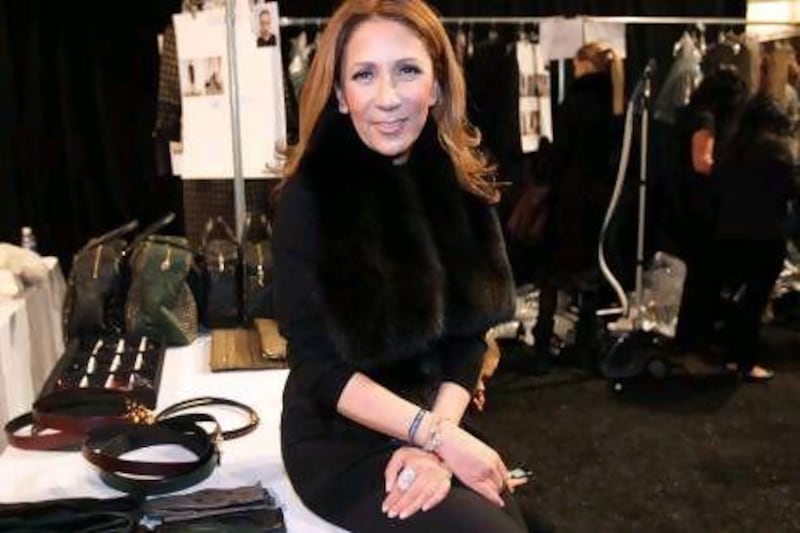Think international Lebanese fashion, and Paris comes to mind: the extravagant couture of Elie Saab and Zuhair Murad, the glamorous French-speaking classes of Beirut, the luxe, groomed, immaculate style common to the lunching ladies of both cities.
Ostensibly, the womenswear of the Levant designers - all embellishment, lace and yard upon yard of silk chiffon - is anathema to the understated style of the US. Yet many years ago, Beirut-born Reem Acra nailed her colours to New York's mast, convinced that the city was a good match for her own designs.
"I've been in New York since 1983. I first came to school here and then went to Paris and studied there and I felt some affinity to New York," she says backstage at Lincoln Center, half an hour before her Autumn/Winter catwalk show begins. "I felt it blended with my personality much more, although I speak French and I have a very French-cultured background; I decided New York was my way of thinking."
In the past few years, with celebrities from Jennifer Lopez to Halle Berry wearing her gowns on the red carpet, she has been proved correct, and the 2012 Golden Globe awards saw a phalanx of Acra-wearers, including Madonna and Lopez. "Red-carpet is hard work, but it pays off at the end," she says. "Dressing Madonna on her award day was just something else."
It's not only in her choice of international forum that she is a pioneer within Lebanese fashion: she's also the only really established female designer from Beirut (though there are young designers in waiting, thanks to the city's vibrant fashion scene), and it's clear that, hidden beneath a tiny figure and gentle manner, she is a woman with grit.
"I came on my own to New York, not knowing anyone and decided I was going to make it. And I did," she says. If that sounds boastful, it certainly doesn't come across as such in person: she's simply stating a fact, perhaps revealing the straight-speaking personality that chimes so well with the East Coast attitude, and softening her words with an excited smile. "You never know your future, but I had a big feeling about New York."
It's no surprise, then, to hear her describe her new collection as being "about power in a feminine way; it's about empowering women with their careers. It's a celebration of all women."
Yet character aside, it takes something more to run a successful fashion business in one of the most competitive markets in the world, and her willingness to modernise her home-city's high-octane glamour is what stands her in such good stead for red-carpet events in the US. "New York showed me that simplicity is part of the game," she says. "I brought some things from my culture, of course - that oomph, that sensuality - but I also made it simple by understanding how another culture works."
The collection Acra revealed on Monday encapsulates that approach, beginning with streamlined, body-fitting leather dresses, with contoured waistlines, wandering through chic little suits and frivolous flapper dresses in beaded chiffon, and ending with the fabulous evening gowns she is known for, all gold sequins, ruffled silk satin and sultry silhouettes.
Most importantly, it is exquisitely proportioned: after all, no one wants to look chunky, droopy, bulgy or stocky in red-carpet photos that could appear around the world. "This collection gives amazing shape, cinching the waist to the extreme, and giving the hips some room, giving a beautiful shape that makes a woman powerful yet sexy," she explains.
This is stuff that will work from LA to Abu Dhabi, and indeed she has what she calls "a huge market in the Middle East", besides her large Lebanon store. For all that she is now, in essence, a New York designer, she regularly visits the region and absorbs its cosmopolitan influences.
"I am from downtown Beirut, and I have a house there; I love it, and of course it's such a powerful country in fashion and in lifestyle and in the nightlife as well, so that does influence me. I go back often, and I keep and eye on lots of customers and lots of friends down there."
The Acra empire, in fact, is beginning to look beyond occasion dressing and beyond America and the East, with a recent initiative to sponsor equestrian dressage events, not only bringing the designer closer to a European audience but also helping to make the name synonymous with something more than beautiful gowns.
Nevertheless, for a designer who barely covers daywear, let alone sportswear, it seems a peculiar match. What could have prompted it?
"Before I came to New York I started to take equestrian classes, and then it all got cut off abruptly and I had to come here," she says. "Since then I thought one day I'm going to do something with it, and I figured out a way of being part of this world."
One of her clients, Princess Haya of Dubai, is president of the International Equestrian Federation (FEI) - "she's just amazing", says Acra with a warm smile - but it is the elegance of dressage (a sort of equestrian choreography) that appeals to the designer.
"Dressage blends with me; I love to dance, I love ballroom dancing and dressage blends with my personality. It's beautiful," she says.
Keep an open mind: Acra has proved her instincts should not be dismissed lightly.
Follow us on Twitter and keep up to date with the latest in arts and lifestyle news at twitter.com/LifeNationalUAE





